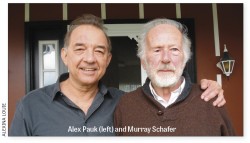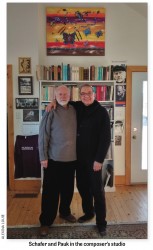 Esprit Orchestra founder and music director Alex Pauk will take the podium at Koerner Hall on the evening of October 23 to lead his orchestra in a heartfelt tribute to Canadian composer and cultural icon, Murray Schafer (b. 1933). Pauk has collaborated with Schafer for over 42 years on a wide range of innovative musical projects that includes 60 performances of Schafer’s works with Esprit alone, not to mention many others that began when the two met in Vancouver in 1973. “The time is right for this tribute,” Pauk told me. “It’s right for Murray, it’s right for Esprit and it’s right for me.” He went on to say that the concert “reflects the amazing relationship between Murray, me, Esprit and the audience.”
Esprit Orchestra founder and music director Alex Pauk will take the podium at Koerner Hall on the evening of October 23 to lead his orchestra in a heartfelt tribute to Canadian composer and cultural icon, Murray Schafer (b. 1933). Pauk has collaborated with Schafer for over 42 years on a wide range of innovative musical projects that includes 60 performances of Schafer’s works with Esprit alone, not to mention many others that began when the two met in Vancouver in 1973. “The time is right for this tribute,” Pauk told me. “It’s right for Murray, it’s right for Esprit and it’s right for me.” He went on to say that the concert “reflects the amazing relationship between Murray, me, Esprit and the audience.”
When they first met, Pauk was engaged by the Vancouver Youth Symphony Orchestra (VYSO) and Schafer was in his last years of teaching at Simon Fraser University (SFU). In 1974 Pauk conducted Schafer’s North/White, a work composed that year for full orchestra and snowblower, with the VYSO. At that time, Pauk was looking for academic work at SFU, and he asked Schafer if he might help or offer advice. Schafer’s reply may have turned Pauk’s fate. He said: “You’ll be better off if you stick to conducting contemporary music, and the rest of us will be better off too.”
The VSYO released Pauk from his conducting position in 1977, in what Pauk felt was a reaction to his programming of “too much contemporary repertoire.” But by then Pauk had met the Romanian/French composer/conductor Marius Constant. Constant was touring the world conducting contemporary repertoire, including his own, and he found frequent conducting opportunities in Vancouver with the CBC Vancouver Orchestra. Constant provided a career archetype for Pauk, one that matched the guidance Pauk had received from Schafer. He befriended Constant, and the two discovered they shared artistic interests. For example, Constant remarked how very interesting the works of Schafer were, particularly those he had conducted with the Radio Orchestra in Vancouver.
The freshly inspired Pauk returned to Toronto in 1980 with a mission to create a contemporary music orchestra and in 1983 founded Esprit Contemporaine, soon to be renamed Esprit Orchestra. The works of Schafer figured prominently in Esprit’s programming from the very beginning. Alex told me that it was while preparing a performance of Schafer’s Dream Rainbow Dream Thunder that he was suddenly struck by the realization that Schafer’s ear and skill with the art of orchestration was extraordinary. He realized as well that “Schafer’s orchestral music is about ideas – BIG ideas!” And his sonic palette was designed to project those powerful musical aspirations.
This observation about Schafer’s extraordinary gift for writing orchestral music was not lost on me, as I began to expand my own appreciation of his music through hands-on experience. Having created Two New Hours, the network contemporary music series on CBC Radio Two (1978-2007), I began recording and broadcasting concerts with Esprit Orchestra almost from its inception. Among the many fascinating new orchestral compositions my broadcast team and I encountered, it was the works of Schafer that stood out. We were impressed with the orchestration, the breadth and power of the ideas and simply the realization that Schafer’s writing sounded brilliant in every way, especially given the exceptionally high standard of performance delivered by Esprit. These were the characteristics that would make for compelling radio, and we were inspired to do our utmost to help make these works sound as vivid and convincing on air as they were in the concert hall.
I had known Murray since first meeting him in 1971 during the Dayspring Festival at Toronto’s Metropolitan United Church. His artistic leadership was immediately apparent, as he showed no fear whatsoever for being out among the throng, constantly challenging and provoking people. He was also fearless about taking music away from its comfort zone in the concert hall. A wilderness lake was just as good a venue for music, complete with its built in audience of loons, chipmunks, frogs and, yes, even bears and wolves.
My engineers and I went with Murray and his hand-picked group of musicians to Wildcat Lake in the Haliburton Forest and Wildlife Reserve to make a radio program called Wolf Music in 1996. This was to be a radio program made of Schafer’s music, played in the wilderness, interspersed with his gently spoken reflections on the relationships between mankind and nature. The recordings we made at dawn when the wind was still, using groups of microphones positioned around the lake were eventually assembled, synced in our editor and broadcast, both on CBC’s Two New Hours and also in Germany, on Westdeutscher Rundfunk. Wolf Music received a special citation at the 1998 Prix Italia in Assisi. The recording is available on the Centrediscs label (CMCCD 8902).
This adventure proved to be a mere test for us to determine whether it might be feasible to record and broadcast the 1997 Patria Music/Theatre Projects’ production of Schafer’s environmental opera, Princess of the Stars. On the strength of Wolf Music, this subsequent challenge was agreed to, and the entire cast of singers, canoe paddlers, stagehands, puppets and the members of Esprit Orchestra, all decamped to Wildcat Lake for the duration of the production in the late summer of that year. The Two New Hours team went along too, and several performances were recorded and eventually broadcast on CBC Radio Two. In 1999 that production won a medal for excellence in broadcasting in the International Radio Festival of New York.
 Nearly 20 years and hundreds of compositions later, Schafer has written music for all situations: the wilderness, the countryside and, alas, even the concert hall. I had several opportunities to commission works from Schafer for broadcast on Two New Hours, including the dramatic aria, Thunder, Perfect Mind. This work, based on an ancient Egyptian text, had its premiere in a performance by Esprit Orchestra and Pauk, with soprano Eleanor James, Schafer’s wife, at Jane Mallett Theatre in Toronto in 2004. We subsequently recorded the work in Glenn Gould Studio for release on Atma Classique. That recording, which also includes James’ performances with Esprit and Pauk of Schafer’s Letters from Mignon and an orchestration of his early work, Minnelieder, is currently available in the Atma Classique catalogue.
Nearly 20 years and hundreds of compositions later, Schafer has written music for all situations: the wilderness, the countryside and, alas, even the concert hall. I had several opportunities to commission works from Schafer for broadcast on Two New Hours, including the dramatic aria, Thunder, Perfect Mind. This work, based on an ancient Egyptian text, had its premiere in a performance by Esprit Orchestra and Pauk, with soprano Eleanor James, Schafer’s wife, at Jane Mallett Theatre in Toronto in 2004. We subsequently recorded the work in Glenn Gould Studio for release on Atma Classique. That recording, which also includes James’ performances with Esprit and Pauk of Schafer’s Letters from Mignon and an orchestration of his early work, Minnelieder, is currently available in the Atma Classique catalogue.
The Esprit concert at Koerner Hall later this month will include a rarely performed Schafer composition, Adieu Robert Schumann (1976) – a CBC commission, written for Maureen Forrester), incorporating writings from the diaries of Clara Schumann detailing her ailing husband Robert’s decline, and using as well fragments of Schumann’s own compositions. The soloist, Krisztina Szabó, speaking about her role as Clara Schumann, says she is “struck by the poignancy of Clara’s thoughts,” as she watches her husband slip away. Szabó, who grew up singing Schafer’s choral music as a member of the Toronto Children’s Chorus and who has been a soloist in other Schafer works says, “I love the evocative colours in his vocal writing … “I find that Schafer’s music calls to me.”
Two works on the concert that are more commonly associated with Esprit are the Concerto for Flute and Orchestra (1985), which was, in fact, the first work of Schafer ever performed by Esprit, in 1987, and the Esprit-commissioned Scorpius (1990), a sort of orchestral scherzo. Esprit has programmed these works often and, in the case of Scorpius, has realized excellent value from one of their five Schafer commissions.
Flutist Robert Aitken, the soloist in Schafer’s flute concerto, says this will be his 18th performance of the work. He told me: “It’s the most successful flute concerto of our time. Whenever it’s played, it’s a huge success, it always steals the show.” Pauk added, “It’s simply one of the great flute concertos of all time.”
Esprit’s tribute to Schafer underscores a long and fruitful relationship between Canada’s most revered composer and the country’s only symphony orchestra exclusively devoted to the creation and performance of contemporary music. Pauk told me that “Schafer’s music embraces so many dimensions, ideas, emotions, theatricality, spirituality and even humour, all unified within a musical experience.” He says that this completeness is what makes Schafer so enduring, and this concert is perfect proof of that.
Murray Schafer and Eleanor James will attend the Esprit concert on October 23; one week later, on October 30, coincidentally also at the Royal Conservatory of Music, they will be present as harpist Judy Loman launches a 2-CD compilation of Schafer’s complete works for the harp. Loman told me: “Because it’s my 80th birthday, it has now become my birthday present to myself to include the launching of this CD.” Schafer composed seven major works for the harp, five of them for Loman and two for her students, Lori Gemmell and Heidi Krutzen. The CD, titled Ariadne’s Legacy, will be available from Centrediscs, the record label of the Canadian Music Centre.
David Jaeger is a Toronto-based composer, producer and broadcaster.



